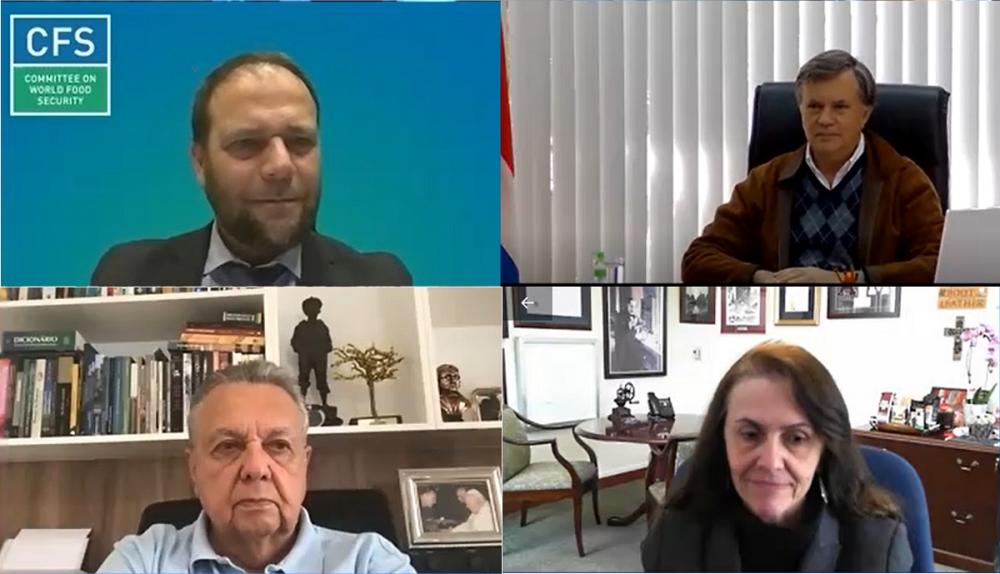Chairperson of the Committee on World Food Security warns that Sustainable Development Goals will only be achieved through fairer, more inclusive agrifood systems

San Jose, 9 February 2022 (IICA). Global governance bodies must coordinate policies to make agrifood systems fairer and more inclusive, as efforts in this regard will play a decisive role in combating hunger and malnutrition and leveraging the achievement of many of the Sustainable Development Goals (SDGs) established by the international community.
This was one of the statements made by Ambassador Gabriel Ferrero, Chairperson of the Committee on World Food Security (CFS), the primary intergovernmental platform for the fight against hunger, during a meeting among leading agrifood specialists, organized by the Inter-American Institute for Cooperation on Agriculture (IICA).
Ferrero, a Spanish national, was the guest speaker at a meeting of IICA’s Advisory Council for Food Security in the Americas.
Created in March 2020, the Council is made up of leading professionals with broad experience in this area, both in the political and academic spheres. Its mission is to monitor the impact of the Covid-19 pandemic on food security in the region, with a view to offering analyses and recommendations that may inform the decision-making processes of various public and private sector entities.
Among the members of the Council, which is led by the Director General of IICA, Manuel Otero, are Gloria Abraham (Costa Rica), Chelston Brathwaite (Barbados), Carlos Gustavo Cano (Colombia), Cassio Luiselli (Mexico), Elsa Murano (United States), Martín Piñeiro (Argentina), Álvaro Ramos (Uruguay), Roberto Rodrigues (Brazil), Silvia Sarapura (Canada), José María Sumpsi (Spain) and Eduardo Trigo (Argentina).
Ferrero, who previously served as Director General of Sustainable Development Policies at the Ministry of Foreign Affairs of Spain, explained that the CFS is the main global governance body for food security and nutrition, and is currently made up of 133 countries. He also noted the interest of the CFS in holding a meeting hosted by IICA later this year.
The diplomat explained that the CFS was established in 1974 and reformed in 2009 amidst significant global upheaval, when rising food prices sparked popular protests in various countries around the world, demonstrating that systemic and multi-causal crises cannot be addressed at the national level alone.
Ferrero explained that, at present, the CFS brings together governments, civil society, agricultural producers and the United Nations system, enabling them to reach agreements on various topics, such as the guiding principles for sustainable investments with a positive impact, guidelines on land use for biofuel production, water use, agroecology and other innovative systems for sustainable production.
“This year”, he announced, “we will engage in what we anticipate will be difficult negotiations on guidelines for the inclusion of women and girls, gender equality in food systems and the future of youth. Next year, deliberations will focus on data use to improve food security”.
Ferrero expressed his appreciation for the decision of UN Secretary-General Antonio Guterres to convene the 2021 Food Systems Summit.
“Food systems are facing a crisis that predates the Covid-19 pandemic, not only because of hunger and undernourishment, but also because of malnutrition – which is associated with non-communicable diseases – and because of their contribution to climate change and their impact on biodiversity”, considered Ferrero.
The diplomat stated that improving the economic, social and environmental sustainability of food systems is key to achieving the 17 SDGs, which form part of the 2030 Agenda of the United Nations.
Ferrero acknowledged the need for “systemic thinking and actions to facilitate environmental, rural and economic transformation in all countries, through the provision of safe and nutritious food”.
“We must communicate to understand how we are working and to compare our agendas. A single committee will no longer resolve everything on its own; we need what I call a chairpersons”, he explained.
In this sense, he noted that different organizations should cease to address issues autonomously, and become more attuned to the reality of countries.
Additional topics addressed during the dialogue of the Advisory Council for Food Security in the Americas included the resurgence of inflation at the global level, which impacts food prices in particular and has serious social consequences; the need to ensure that agrifood systems transition towards greater sustainability in a fair manner – meaning that those with fewer resources don’t pay the highest price; and the need for greater communication and connection between global and regional governance bodies.
Meet the members of IICA’s Advisory Council for Food Security in the Americas:
https://www.iica.int/en/press/news/silvia-sarapura-newest-member-iicas-advisory-council-food-security-americas
More information:
Institutional Communication Division.
comunicacion.institucional@iica.int